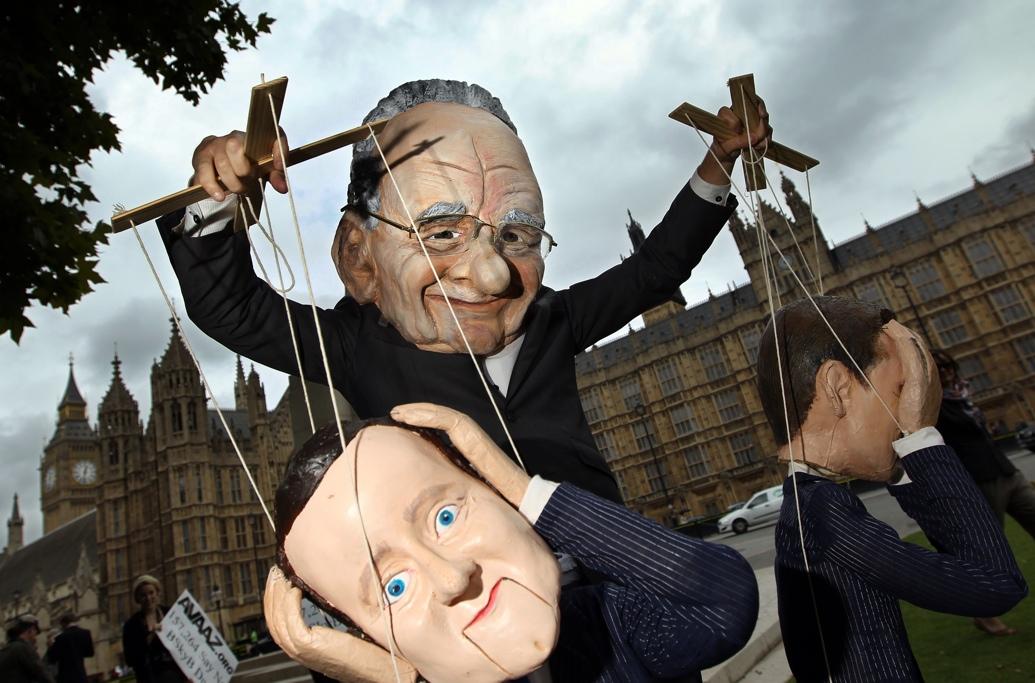Rupert Murdoch goes on the offensive
A Rupert Murdoch puppet pulls the strings of British Prime Minister David Cameron (foreground) and Jeremy Hunt, the British minister for culture, media and sport.
LONDON — Last year, Rupert Murdoch struck a contrite note to UK lawmakers over the phone-hacking scandal involving his newspapers. He told them it was his “most humble” day.
The scandal cost him one of his most lucrative titles — the tabloid News of the World — and resulted in possible criminal charges for his trusted lieutenant Rebekah Brooks and the arrest of a dozen reporters on his beloved Sun newspaper.
Now, Murdoch appears to be fighting back.
He and his son James were in the UK this week to face the Leveson inquiry, a judicial investigation into press standards, begun last year in the wake of revelations that journalists at Murdoch’s UK titles illegally hacked the voicemails of prominent public figures.
This time, he and his family appear to have turned on the British establishment, pressuring Prime Minister David Cameron, and putting a key minister in the spotlight over a controversial business deal.
Read more: London's mayoral race, full of (flawed) superheroes
In his evidence on Tuesday, James Murdoch released documents that appeared to show that Jeremy Hunt, a media minister charged with examining a $13.4 billion bid by Murdoch’s News Corp. for full control of British Sky Broadcasting, had secretly helped to progress the deal.
The revelations sent Cameron’s government into a tailspin. Cameron pledged to stand by Hunt — who is overseeing the 2012 Olympics — while Hunt himself was forced to defend his actions to parliament, denying claims he gave News Corp. a “back channel” of influence over the bid.
In an attempt to limit the damage, Hunt’s adviser Adam Smith — a key link in communications with James Murdoch — tendered his resignation at the same time that a relaxed-looking Murdoch senior was taking the stand to deny he held any sway over Britain’s politicians.
News Corp.’s bid to buy BSkyB was ruled out last year in the wake of the phone-hacking scandal, an outcome that soured once-cordial relations between Murdoch and Cameron. This breakdown appears to have set the tone for the Murdoch’s reappearance.
Even before giving evidence at the Levenson inquiry, Rupert Murdoch appeared to be on the offensive against the government. Last month he took to Twitter to complain about “old toffs and right wingers” — a likely dig at the British establishment.
Read more: Protesters gear up for London's Olympic Games
More followed when he arrived in London last weekend. In one tweet he criticizes the economic policies of Cameron’s government. “Govt sending IMF another ten bn to he euro. Must be mad,” he wrote.
Murdoch’s offensive and the question mark over Hunt couldn’t come at a worse time for Cameron. His government is already under fire for provoking a recent fuel crisis and for a financial budget that was derided in parliament as an “omnishambles.”
A recent poll showed the ruling Conservatives have lost their command over the main opposition Labour party, largely as a consequence of the budget.
To make matters worse for Cameron, it was announced on Wednesday that Britain had slumped back into recession despite forecasts of economic recovery.
But, despite his tweets, Murdoch insists he hasn’t been gunning for the government. Asked by Leveson counsel Richard Jay if “rumors” were true that he had not forgiven Cameron, he said they were not. He added: “Don’t take my tweets too seriously.”
Speculation had been rife that Murdoch would use his Leveson appearance to launch a “slash and burn” offensive, as one commentator put it. Some speculated his revelations could take direct aim at Cameron, possibly making the prime minister’s position untenable.
Read more: Why Russian oligarchs love London courts
This follows allegations that Cameron has already compromised his integrity as a consequence of his former proximity to the Murdoch empire and individuals closely linked to phone hacking, particularly former Sun editor Andy Coulson, who once worked as Cameron’s press adviser.
Instead Murdoch spent most of it languidly failing to recollect specific meetings with former leaders and vigorously denying he had any real influence over British politicians. He said he had “never asked a British prime minister for anything.”
He said he had neither requested nor been offered favors from Margaret Thatcher nor Tony Blair. He also denied discussing the BSkyB deal with Cameron.
Meanwhile, over in the House of Commons, a very hot-under-the-collar Cameron was offering a mea culpa of sorts. "I think we all, on both sides of this house, did a bit too much cozying up to Mr. Murdoch," he told fellow lawmakers.
The last time Murdoch was questioned in the UK, he memorably ended up with a shaving cream pie shoved in his face. This time, it appears to be the turn of the government.
The article you just read is free because dedicated readers and listeners like you chose to support our nonprofit newsroom. Our team works tirelessly to ensure you hear the latest in international, human-centered reporting every weekday. But our work would not be possible without you. We need your help.
Make a gift today to help us reach our $25,000 goal and keep The World going strong. Every gift will get us one step closer.
